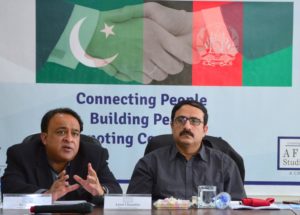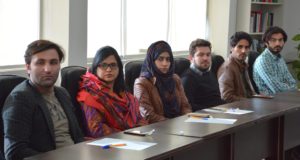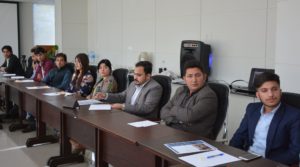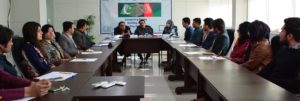In Pakistan and Afghanistan, democracy can more aptly be described as ‘government off the people, (government) far (from) people and (government to) buy people,’ stated Mr. Jami Chandio. He was speaking at the Center for Research & Security Studies’ (CRSS) seventh Pak-Afghan youth training workshop on Wednesday, February 21, held under its Afghan Studies Center initiative, which was attended by several young Pakistani and Afghan students and professionals. Contrary to the true application of democracy in its real essence, Mr. Chandio stated, that democracy in Pakistan and Afghanistan is confined only to the quantitative representation of the people and neglects its qualitative aspects, depriving the vast populations of their civil, economic and political rights. The workshop comprised of three sections; democracy in theory and practice, democracy in Pakistan and the way forward for Pakistan and Afghanistan. Mr. Jami Chandio, who was invited the Chief Guest and trainer, is a writer, scholar, literary critic, political expert and activist. He is also the Executive Director of a Sindh-based think tank, Center for Peace and Civil Society, Hyderabad.

Mr. Chandio explained that the spirit of democracy is not confined to any single geographical entity or civilization. Rather, it is a universal human concept which existed in one form or the other in civilizations all over the world in history, and evolved overtime to take the form it is in today. He stated that human civilization broadly witnessed three major periods of transition, progressing from hunter-gatherers to tribal communities, monarchies and, consequently, empires where humans became subjects to sovereigns and the concept of free people seized to exist. The oppression under such a political order culminated in the age of reason which pushed the thought process towards a system that should represent the wishes of the people, such as the modern democratic system.
Fast forward a few centuries; emphasizing on the importance of a constitution to lay down the foundation of a democratic system, Mr. Chandio stated that Pakistan inherited its constitutional framework from India Act 1935. Unfortunately though, it took nine long years for the newly independent state to formulate its first Constitution which further underwent several more amendments until 1973 when the Constituent Assembly unanimously passed Pakistan’s existing Constitution which is still in force today.
Of the existing models of democracy in the world, such as liberal democracy, social democracy, and people’s democracy, Afghanistan and Pakistan fall under the category of transitional democracies. Speaking in the context of Pakistan and Afghanistan, he stated that both countries currently can rather be described as oligarchies controlled by elites. Additionally, both countries face common challenges, such as economic disparity, poverty, intolerance, gender inequality, sectarian violence, ethnic divisions, radicalization and terrorism, which can only be addressed through consolidation of true constitutional democracy. Conflict, being another major mutual challenge, the trainer articulated that democracy provides a peaceful means to the resolution of disputes and conflicts as it is an auto-dynamic system and can evolve and amend itself.

Democracy is not only a political system; it is also the process of social education, training and evolution. Both Pakistan and Afghanistan have to understand the needs of contemporary times. In conclusion, Mr. Chandio expressed that democracy is very significant for both Pakistan and Afghanistan as it is the only viable way forward for an egalitarian society; the key to true democracy, however, is continuity and evolution with the passage of time.


In the discussion session, participants raised several issues including regarding the status of FATA & Gilgit Baltistan, and the rights as per Pakistan’s constitution for their residents, whether state affairs should be kept separate from religion as well as whether the western model of democracy can be applied to Pakistan and Afghanistan as they have their own indigenous values and culture.
After Mr. Chandio’s replies to all their queries, participants commended him for a very open and dispassionate overview of history and current state of affairs. Several participants told Mr. Chandio that it was the best workshop that they had ever attended and also commended the efforts of CRSS for organizing this platform for sharing such useful knowledge and giving them food for thought for critical thinking.

CRSS Project Director Mr. Aized Ali, who was the moderator of the session, thanked the participants and the distinguished Chief Guest for his insightful training session and briefed the audience on the upcoming meeting of visiting Afghan delegation under CRSS Pak-Afghan Track 1.5/II initiative Beyond Boundaries. The workshop was attended by 20 young Afghan and Pakistani participants. This was the 7th workshop in the series of Afghan Studies center’s youth training workshops. In addition, the Center also conducts a monthly Pak-Afghan Youth Dialogue. The session ended with a group photo.

